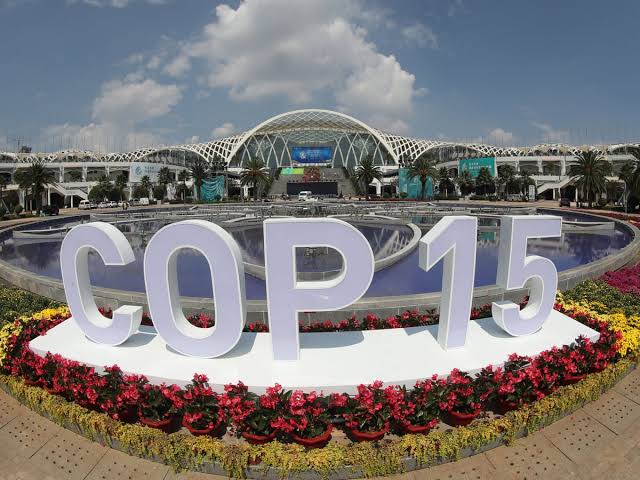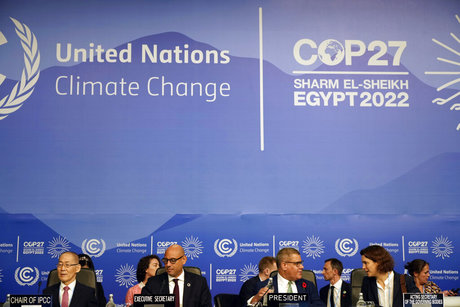By Dare Akogun
The United Nations Climate Change Conference COP27 ended today with the historic creation of a United Nations loss and damage fund, funding for vulnerable countries hit hard by climate disasters.
Set against a difficult geopolitical backdrop, COP27 resulted in countries delivering a package of decisions that reaffirmed their commitment to limit global temperature rise to 1.5 degrees Celsius above pre-industrial levels.
The package also strengthened action by countries to cut greenhouse gas emissions and adapt to the inevitable impacts of climate change, as well as boosting the support of finance, technology and capacity building needed by developing countries.
Creating a specific fund for loss and damage marked an important point of progress, with the issue added to the official agenda and adopted for the first time at COP27.
Governments took the ground-breaking decision to establish new funding arrangements, as well as a dedicated fund, to assist developing countries in responding to loss and damage.
Governments also agreed to establish a ‘transitional committee’ to make recommendations on how to operationalize both the new funding arrangements and the fund at COP28 next year. The first meeting of the transitional committee is expected to take place before the end of March 2023.
UN Climate Change Executive Secretary Simon Stiell said the outcome moves the conference forward from last year.
“We have determined a way forward on a decades-long conversation on funding for loss and damage – deliberating over how we address the impacts on communities whose lives and livelihoods have been ruined by the very worst impacts of climate change,” he said.
Parties also agreed on the institutional arrangements to operationalize the Santiago Network for Loss and Damage, to catalyze technical assistance to developing countries that are particularly vulnerable to the adverse effects of climate change.
COP27 saw significant progress on adaptation, with governments agreeing on the way to move forward on the Global Goal on Adaptation, which will conclude at COP28 and inform the first Global Stocktake, improving resilience amongst the most vulnerable. New pledges, totaling more than USD 230 million, were made to the Adaptation Fund at COP27.
These pledges will help many more vulnerable communities adapt to climate change through concrete adaptation solutions.
COP27 President and the Egyptian Foreign Affairs Minister Sameh Shoukry announced the Sharm el-Sheikh Adaptation Agenda, enhancing resilience for people living in the most climate-vulnerable communities by 2030.
The UN Climate Change’s Standing Committee on Finance was requested to prepare a report on doubling adaptation finance for consideration at COP28 next year.
The cover decision, known as the Sharm el-Sheikh Implementation Plan, highlights that a global transformation to a low-carbon economy is expected to require investments of at least USD 4-6 trillion a year.
Delivering such funding will require a swift and comprehensive transformation of the financial system and its structures and processes, engaging governments, central banks, commercial banks, institutional investors and other financial actors.
Serious concern was expressed that the goal of developed country Parties to mobilize jointly USD 100 billion per year by 2020 has not yet been met, with developed countries urged to meet the goal, and multilateral development banks and international financial institutions called on to mobilize climate finance.
The Climate Action Network Canada joins communities from the Global South, island states, and civil society worldwide in celebrating this global agreement after a thirty-year-long fight.
This decision sends a message of climate justice and hope that polluters will be made to pay up for the suffering they are inflicting and that those on the front lines of the climate crisis will have support to rebuild and recover.
Canada – a major and historic emitter – played an important role in offering early support for the call of climate-vulnerable nations. Now, it must extend this support by committing funding and ensuring that the set-up of the fund is led by and responds to the needs of the most vulnerable countries.
COP27 closes with a declaration that makes no mention of phasing out fossil-fuels, but with a growing consensus – led by India, Colombia, and the Alliance of Small Island States – that a climate process that doesn’t tackle fossil fuels is a hijacked process that fails to protect people and communities around the world.
In Canada, keeping 1.5 alive means taking fossils out of our electricity grid, cars, and homes and buildings. To do so will require implementing key climate policies with ambition and rigour, while avoiding caving in to industry’s pressure.
This COP has brought international attention to the connections between human rights and climate justice. The closing of COP27 must not mean the end of the spotlight on human rights and the need for all prisoners of conscience to be freed.
Climate Action Network Canada will continue standing in solidarity with defenders of human rights and calling for open civic space everywhere.
Parties Silent on Biodervesity
The decision text fails to include mention of the Convention on Biological Diversity COP15 taking place in Montreal this December, meant to establish an ambitious agenda for nature protection for the next decade.

Indigenous rights are highlighted in the context of the Global Goal on Adaptation, but must inform all decisions taken in the UNFCCC, as Indigenous sovereignty and lands continue to be threatened by those who promote fossil fuel expansion and the use of fake carbon credits under Article 6.
Key takeaways from the COP27 outcome:
COP27 also made progress in addressing the urgent climate finance gap. There cannot be an increase of ambition without scaling up financial flows that align with a 1.5°C-compatible future. This COP saw the launch of the Sharm el-Sheikh dialogue on Article 2.1c. With this work, governments must begin shifting financial flows away from fossil fuel subsidies.
Progress on mitigation has largely stalled, with a cover decision that opens the door to loopholes for gas expansion, despite the clear and urgent need for faster and deeper emissions cuts. Keeping 1.5C within reach requires Canada to step up.
We call on Canada to use the Mitigation Work Programme as an opportunity to strengthen its domestic action and its Nationally Determined Contribution, as called for in the Glasgow Pact.
Transformational adaptation action saves lives, yet it continues to receive inadequate attention and funding. The Sharm el-Sheikh Implementation Plan reiterates the Glasgow commitment for rich countries to double adaptation finance; Canada must follow through and commit to increasing adaptation finance to 50% of all climate finance.
COP27 also delivered the creation of a just transition work programme and emphasis on the need for social dialogue – an important milestone that is the result of the hard work of the labour movement. Vigilance will be needed to ensure that Just Transition remains centered on workers’ rights, and is not diluted or used as a cover to promote techno-fixes or false solutions

